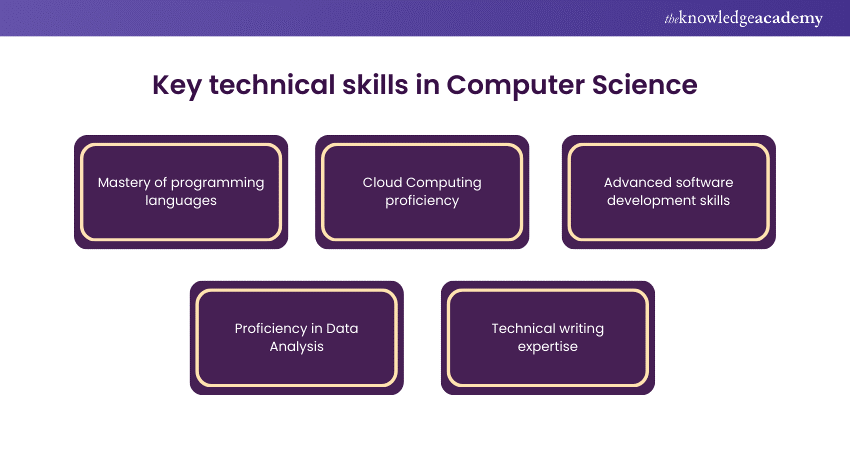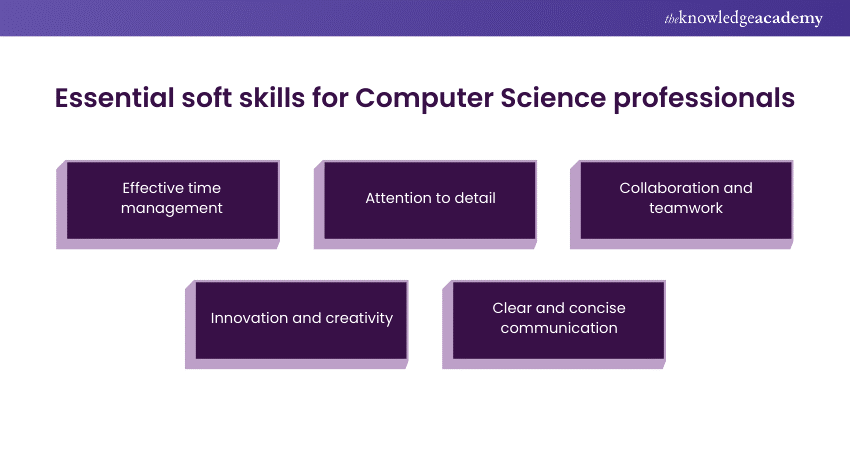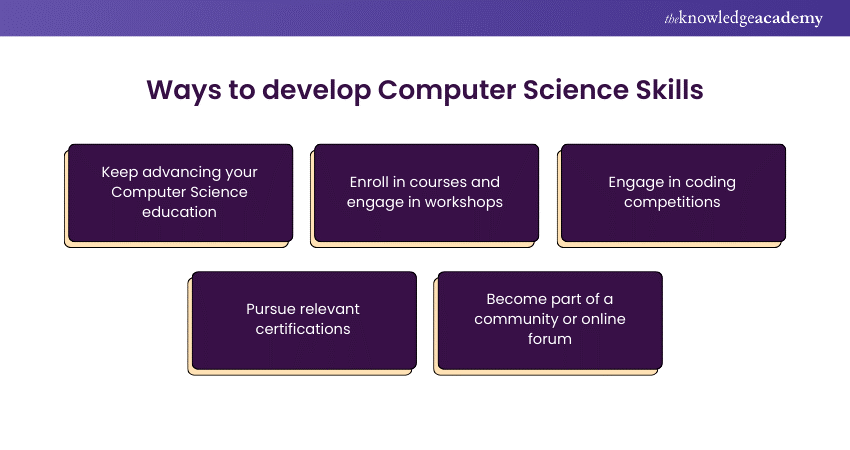We may not have the course you’re looking for. If you enquire or give us a call on +44 1344 203999 and speak to our training experts, we may still be able to help with your training requirements.
We ensure quality, budget-alignment, and timely delivery by our expert instructors.

In the tech industry, staying competitive requires a robust skill set in Computer Science. Whether embarking on a new career or aiming to advance in your current role, you need to master some critical Computer Science Skills. From understanding the intricacies of programming languages to navigating the complexities of cybersecurity, these skills form the basis of a successful career in technology. Do you want to learn more about these Computer Science Skills? Read this blog to know more!
Table of Contents
1) What is Computer Science?
2) Key technical Skills in Computer Science
3) Essential soft skills for Computer Science professionals
4) Additional skills needed for Computer Science
5) Ways to develop Computer Science Skills
6) Conclusion
What is Computer Science?
Computer Science is a diverse field that studies computers and other computational systems. Unlike electrical and computer engineering, Computer Science primarily deals with software and various software systems which includes their theory, design, development, and application.
Primary fields of study in Computer Science include artificial intelligence, computer systems and networks, security, database systems, human-computer interaction, vision and graphics, numerical analysis, programming languages, software engineering, bioinformatics, and theory of computing. For those looking for a Course After Graduation in Science, Computer Science offers a wide array of specialisations. It’s a discipline that involves solving complex problems and the creation of software that enhances the capabilities of both humans and machines.
Key technical Skills in Computer Science
These Computer Science Skills pave the way for innovative solutions and empower individuals to address complex computational challenges effectively. Here's an exploration of five key technical proficiencies in Computer Science:

1) Programming languages
Mastering programming languages forms the foundation of Computer Science. The knowledge of different languages such as Python, Java, C++, and JavaScript is crucial because they are the primary tools for developing software, solving computational problems, and creating applications. Each language has unique syntax, semantics, and use cases, ranging from web development and mobile applications to systems programming and artificial intelligence.
A deep understanding of multiple programming languages enables computer scientists to choose the right tool for the task at hand, optimising both the development process and the performance of the resulting software.
2) Cloud Computing
Cloud Computing has revolutionised how businesses deploy and manage IT resources, making proficiency in this area indispensable. Skills in cloud platforms like Amason Web Services (AWS), Microsoft Asure, and Google Cloud Platform (GCP) allow professionals to design, implement, and manage scalable, reliable, and secure Cloud-based solutions.
Knowledge of cloud services, architecture, and security practices is essential for developing applications that leverage the cloud's power for storage, computation, and big data processing, ensuring cost-effectiveness and efficiency in operations.
3) Software development
Beyond basic programming, advanced software development skills are vital for creating complex, high-quality software systems. This includes understanding software development methodologies (such as Agile and DevOps), version control systems (like Git), testing and debugging techniques, and software design patterns.
These skills enable the development of robust, maintainable, and scalable software solutions. Furthermore, familiarity with Continuous Integration/Continuous Deployment (CI/CD) pipelines and containerisation technologies like Docker enhances the ability to deliver software quickly and reliably.
4) Data Analysis
In an era dominated by Big Data, the ability to analyse and interpret data is valuable. Proficiency in data analysis involves understanding statistical methods, data visualisation, and using data analysis tools and programming libraries (e.g., Pandas in Python and R programming).
This skill set is crucial for identifying trends, making predictions, and informing business decisions. Additionally, the knowledge of machine learning algorithms and frameworks adds a valuable dimension to a computer scientist's skill set, enabling the development of predictive models and intelligent systems.
5) Technical writing expertise
The ability to communicate complex technical information effectively is often overlooked but immensely valuable. Technical writing expertise includes creating concise documentation for software projects, user manuals, and research papers.
This skill ensures that technical knowledge is accessible to other developers, stakeholders, and users, facilitating better understanding and use of technology solutions. Good technical writing aids in disseminating knowledge within the scientific community and contributes to the successful adoption and implementation of software products, especially when considering the growing importance of Computer Science Vs Cyber Security in today's technological landscape.
Learn how to become an End User today – register now for our End User Training!
Essential soft skills for Computer Science professionals
Here’s a look at five essential soft skills for Computer Science professionals to ensure project success:

Effective time management
Time management is important in a field that is often governed by tight deadlines and complex projects. Effective time management enables professionals to prioritise tasks, set realistic deadlines, and allocate resources appropriately. This skill ensures that projects progress smoothly and objectives are met on time, contributing to overall productivity and reducing stress.
Attention to detail
Given the precision required in coding and software development, a keen eye for detail is indispensable. This skill prevents minor errors that could lead to significant issues, ensuring high-quality outputs. Attention to detail is crucial in debugging, writing clean code, and developing user-friendly interfaces. All these factors impact software applications' functionality and user experience.
Collaboration and teamwork
Computer Science projects often involve multidisciplinary teams, making the ability to work collectively a vital skill. Teamwork fosters a shared understanding and approach to problem-solving, leveraging diverse perspectives and expertise. Effective collaboration leads to innovative solutions and enhances learning, making tackling complex challenges easier and achieving shared goals.
Innovation and creativity
Innovation and creativity are at the heart of technological advancement. Thinking outside the box and approaching problems creatively allows Computer Science professionals to develop novel solutions, improve existing technologies, and drive progress. This skill is crucial for designing new software, improving user interfaces, and creating algorithms to tackle emerging challenges.
Clear and concise communication
Clear communication is essential for conveying complex technical concepts to non-technical stakeholders, colleagues, and clients. It involves explaining technical processes, project needs, and results in an understandable manner.
Effective communication helps in ensuring that all team members are on the same page, facilitates collaboration, and aids in the successful implementation of projects. It's also crucial for documentation, presentations, and teaching, making complex ideas accessible to various audiences.
Learn how to use G Suite with our Google G Suite Training today!
Additional skills needed for Computer Science
In addition to the essential technical and soft skills, there are other skills that Computer Science professionals should cultivate to improve their career prospects and professional growth. Two such skills include technical documentation and interview skills, which play pivotal roles in the tech industry.
Technical documentation
Producing clear and comprehensive technical documentation is an invaluable skill in Computer Science. Documentation is a guide for users, a reference for developers, and a foundation for future project iterations. Adequate technical documentation includes writing API guides, user manuals, system architecture descriptions, and in-code comments.
Learning this skill ensures that software products are usable and maintainable, facilitating smoother project transitions and enhancing user satisfaction. It requires understanding the audience's needs, communicating complex concepts into understandable language, and make information easily accessible.
Interview skills
As the tech industry continues to grow, the competition for positions in Computer Science becomes increasingly fierce. Therefore, honing interview skills is crucial for navigating the job market successfully. This includes the ability to articulate one's experience and competencies effectively and demonstrate problem-solving skills through technical interviews.
Preparing for interviews involves understanding common interview questions, practicing coding challenges, and being able to discuss previous projects and roles with clarity and confidence. Additionally, soft skills such as active listening, asking insightful questions, and exhibiting a positive attitude play a significant role in making a solid impression during interviews.
Are you interested in learning the global product attributes? Then sign up for our WooCommerce Training!
Ways to develop Computer Science Skills
Whether you're a budding computer scientist or an experienced professional, there are several effective ways to enhance your expertise and be updated with the latest technological advancements. Here are some ways to develop your Computer Science Skills:

1) Keep advancing your Computer Science education
A strong educational background is essential for building a successful career in Computer Science. Continuously enhancing your knowledge, whether by pursuing a higher degree or taking specialised courses, allows you to develop a deeper understanding of complex concepts and stay informed about emerging technologies. For students exploring options for GCSE, choosing Computer Science can provide a solid foundation that paves the way for future academic and professional success.
Higher education, such as a Master's or Ph.D. in Computer Science, can also open doors to advanced research opportunities, teaching positions, and roles that demand high expertise.
2) Enroll in courses and engage in workshops
The tech industry is known for its rapid pace of change, with new programming languages, frameworks, and technologies emerging regularly. Enrolling in online courses and participating in various workshops can help you stay updated with these trends.
3) Engage in coding competitions
Coding competitions and hackathons are not just platforms to showcase your coding skills but also excellent learning and innovation opportunities. Participating in these events challenges you to think creatively, work under pressure, and solve complex problems efficiently.
Platforms like HackerRank, Codeforces, and LeetCode host competitions that cater to different skill levels, offering a competitive environment to improve your coding abilities and algorithmic thinking.
4) Pursue relevant certifications
Professional certifications can validate your skills and knowledge in specific areas of Computer Science. Certifications such as AWS Certified Solutions Architect, Certified Information Systems Security Professional (CISSP), or Google’s Professional Cloud Architect make your resume more valuable and demonstrate your commitment to professional growth.
Several industry professionals recognise these certifications and can significantly boost your employability and career prospects.
5) Become part of a community or online forum
Joining a community or online forum dedicated to Computer Science is an invaluable way to learn from peers, share knowledge, and connect with like-minded individuals. Communities such as GitHub, Stack Overflow, and Reddit’s R/Programming provide platforms for discussing problems, sharing projects, and receiving feedback.
Participating in these communities can help you stay informed about industry trends, discover new tools and technologies, and improve problem-solving skills through collaborative learning.
Learn how to collaborate dynamic content with our Microsoft Fluid Framework Training – sign up today!
Conclusion
Developing your Computer Science Skills is a multifaceted process requiring formal education, continuous learning, practical experience, and community engagement. By advancing your education, enrolling in courses, participating in coding competitions, pursuing certifications, and becoming part of a community, you can build a comprehensive skill set that prepares you for the challenges and opportunities of the tech industry.
Learn how to enhance your editing techniques with our IMovie Training – join now!
Frequently Asked Questions
How can I start learning Computer Science as a beginner?

Start by understanding the basics of programming through online tutorials or beginner courses in languages like Python or Java. Engage with interactive platforms like ours, which will help you to build a strong foundation in Computer Science.
Do I need a degree in Computer Science to work in tech?

While a Computer Science degree is crucial, it's not mandatory for all tech roles. Many professionals enter the field with degrees in related areas or through self-study, coding bootcamps, and gaining practical experience via personal projects or freelancing.
What's the best way to keep my Computer Science Skills up to date?

Regularly engage in learning through online courses on platforms like ours. Join coding communities, participate in hackathons, and read several tech blogs to stay informed about the latest technologies and industry trends.
What are the other resources and offers provided by The Knowledge Academy?

The Knowledge Academy takes global learning to new heights, offering over 3,000 online courses across 490+ locations in 190+ countries. This expansive reach ensures accessibility and convenience for learners worldwide.
Alongside our diverse Online Course Catalogue, encompassing 19 major categories, we go the extra mile by providing a plethora of free educational Online Resources like News updates, Blogs, videos, webinars, and interview questions. Tailoring learning experiences further, professionals can maximise value with customisable Course Bundles of TKA.
What is Knowledge Pass, and how does it work?

The Knowledge Academy’s Knowledge Pass, a prepaid voucher, adds another layer of flexibility, allowing course bookings over a 12-month period. Join us on a journey where education knows no bounds.
What are related PRINCE2 courses and blogs provided by The Knowledge Academy?

The Knowledge Academy offers various End User Training courses, including Computer Science course, Google G Suite Training, and Google Sheets Masterclass. These courses cater to different skill levels, providing comprehensive insights into Best Computer Science Project Topics.
Our Office Applications blogs covers a range of topics related to Computer Science, offering valuable resources, best practices, and industry insights. Whether you are a beginner or looking to advance your Computer Science Skills, The Knowledge Academy's diverse courses and informative blogs have you covered.
Upcoming Office Applications Resources Batches & Dates
Date
 Computer Science Course
Computer Science Course
Fri 2nd May 2025
Fri 29th Aug 2025
Fri 3rd Oct 2025
Fri 5th Dec 2025






 Top Rated Course
Top Rated Course



 If you wish to make any changes to your course, please
If you wish to make any changes to your course, please


